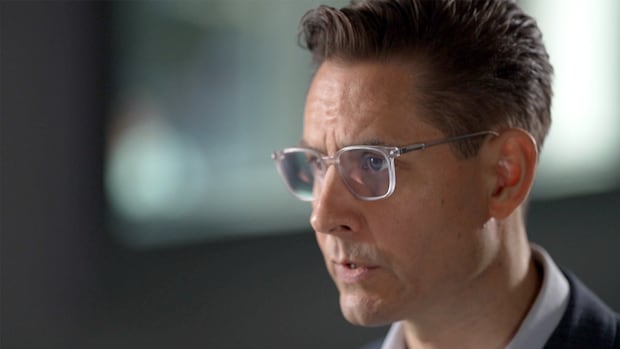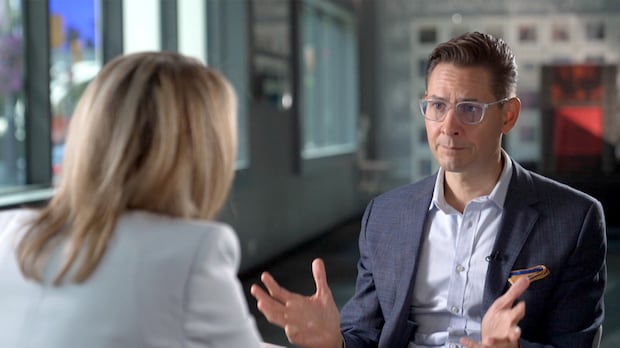On the evening of December 10, 2018, Michael Kovrig went to dinner in Beijing with his six-months pregnant partner, not realizing that it would be his last time together for more than two and a half years.
The couple walked home and up the spiral staircase in front of their apartment building.
“Then there was this boom… I came out on the stairs and there were about 12 men in black, with cameras, dressed similarly… but with no marks or badges or anything, surrounding us and yelling in Chinese, ‘It’s him,'” he told CBC News chief reporter Adrienne Arsenault in an exclusive interview with CBC News that aired Monday.
He said a woman came forward and held up a piece of paper, but he wasn’t given a chance to read it.
“It looked like there was an arrest warrant written in Chinese,” he said. “They grabbed me, took my cell phone so I couldn’t make calls and held down my arms.”
The men had taken his partner away from him, and he said his main concern was her safety and the safety of their unborn child.
Former Canadian diplomat Michael Kovrig told CBC News chief reporter Adrienne Arsenault about how he was arrested in Beijing in 2018 while walking home from dinner with his pregnant partner. Nearly three years passed before he was released from custody.
Kovrig said the men pushed him toward three black SUVs parked nearby, where he was forced into the back seat between two men dressed in black clothing, who blindfolded his face and handcuffed him.
“Fortunately, most of us don’t have to go through the experience of being handcuffed, having another identity thrust upon you right away…My mind was completely quiet,” he said.
Looking down, I could just about see the clock, and after counting the number of right turns and then right turns for 45 minutes, I calculated that we were heading somewhere south of Beijing.
The car eventually slowed, and he heard the sound of gravel crunching under the tires, a gate opening, and a dog barking. After a few minutes, he was removed from the car and taken to an underground car park, then an elevator and finally to an office.
They sat him in a hard chair, removed the blindfold, and as his eyes adjusted to the light he saw an older Chinese man wearing thick glasses sitting opposite him.
“I tried to control myself and not panic. I quickly determined that yelling and screaming wasn’t going to gain me anything, so I asked what on earth this was all about,” Kovrig told CBC News.
He was told he was suspected of endangering China’s national security and would be interrogated.
“It sent chills down my spine,” he said. “It was not a good moment.”
“Relentless interrogation”
He was escorted down a corridor to a soundproofed cell with a bunk in the corner, and two plainclothes guards closed the thick door with a magnetic lock.
“For almost six months, that room was my world. That room and the room across the hall were interrogation rooms,” he said.
The windows in his soundproof room were darkened and the fluorescent lights left on 24 hours a day.
“Mentally, it was, without a doubt, the most grueling and painful thing I’ve ever experienced,” he said. “It was … a combination of total isolation and relentless interrogation for six to nine hours every day.”
Former Canadian diplomat Michael Kovrig, who was detained in China for nearly three years, spoke to CBC News chief reporter Adrienne Arceneaux about the interrogations he endured during six months in solitary confinement. “They’re trying to intimidate you, torment you, threaten you, coerce you, try to make you believe you’re guilty when you’re not,” Kovrig said.
“They are trying to intimidate, harass, threaten and coerce you … into accepting their false reality that you are guilty.”
“And the only way to save yourself is to humble yourself, throw yourself at their mercy, ask for forgiveness, apologize, and confess.
“Under UN standards, solitary confinement should not exceed 15 days. Anything longer is considered psychological torture. I spent almost six months there.”
The torture was psychological, not physical, he said.
On December 14, four days after his detention, Kovrig had his first consular meeting with then-Canadian Ambassador John McCallum and another embassy official at an off-site location.
Kovrig said he remembers trying to tell him in that and other meetings that China was violating international law by interrogating him.
Kovrig said that during his first months, he experienced repeated feelings of anxiety, sadness, humiliation, shame and guilt that his detention might be causing trouble to his family.
He said his food rations were cut because he was uncooperative, and that he was restrained during interrogation, made to sit in a high-backed wooden chair and not allowed to cross his legs or change positions.
“I realized that what I had to do was somehow find some iron discipline and control my mind and my time,” he said. “So I started following a set of habits and basically creating my own schedule and getting a sense of time.”
Kovrig said he starts his day with yoga, followed by meditation while walking, sitting or lying down.
“After 30 minutes they hadn’t left me alone so something had to be going on. I had to stop,” he said.
Self-taught Chinese in prison
As the months passed, Kovrig said he felt his crisis was also Canada’s crisis, and that his detention had put Canada’s foreign policy on a “total freeze.”
“I decided I needed to be the best detainee I could be. I needed to show them they weren’t breaking me – they weren’t crushing me,” he said.
The following May, Kovrig and another Canadian, Michael Sperber, who had also been detained but held separately, were formally arrested. CBC reported on the allegations on May 16, 2019.
Kovrig was released from his cell and transported to a pretrial detention facility.
Former Canadian diplomat Michael Kovrig, who was detained in China for nearly three years, says he coped with his detention by honing his Chinese language skills. In an interview with CBC News chief reporter Adrienne Arsenault, he explained why thinking of himself as a “Chinese language student” helped him.
“It felt like I went from hell to hell,” he said. “If I had gone straight to jail, it would have been awful, but after solitary confinement it was a big improvement.”
Kovrig spent the next two years there, where he had a cellmate, sunlight through plexiglass windows, and space to walk around.
To survive, he decided to “flip the equation” by increasing his knowledge of the Chinese language during breaks in interrogation, studying a Chinese-English dictionary and spending hours reading Chinese books.
“The Canadian government was not prepared.”
On September 25, 2021, Kovrig and Spavor landed in Calgary aboard a Royal Canadian Air Force Challenger aircraft shortly before 8 a.m. ET on Saturday.
The two had been unlawfully detained in China in retaliation for the arrest in Vancouver of Huawei’s Chief Financial Officer, Meng Wanzhou, who was being held at the request of the United States on fraud charges related to U.S. sanctions against Iran.
The pair left Chinese airspace just hours after the extradition case against her was dropped.
Kovrig told CBC News that Canada needs to be better prepared and have a better strategy if it is to make arrests or take other actions that could anger countries like China.
“For a variety of reasons, the Canadian government was not prepared. “The US government was not prepared for the backlash that would result from Meng Wanzhou’s arrest, so it took a long time to figure out what to do,” he said.
“I think in the end they found the right path, and they put a lot of really talented, capable, motivated people into it, so I don’t fault their efforts,” he said. “But I think in a lot of ways a slightly different approach and understanding the problem sooner might have led to a quicker solution.”
Kovrig’s partner played her recordings of her father’s voice and showed him photos while he was held captive half a world away. She was 2 1/2 years old when her father finally returned to Canada.
“So she immediately knew I was her dad,” he said, “and within the first few hours we were having fun playing together.”
The day after his release, the three of them went for a walk in the park with their dog, and he recalls it was a sun-drenched day, full of green trees and fresh flowers.
“I’ll never forget that feeling of wonder that everything was new and wonderful, and the sensation of my daughter on the swing saying to her mother, ‘Mommy, I’m so happy.'”
“It was a shock I’ll never forget,” Michael Kovrig, a former Canadian diplomat who was held in China for nearly three years, told CBC News chief correspondent Adrienne Arsenault.




